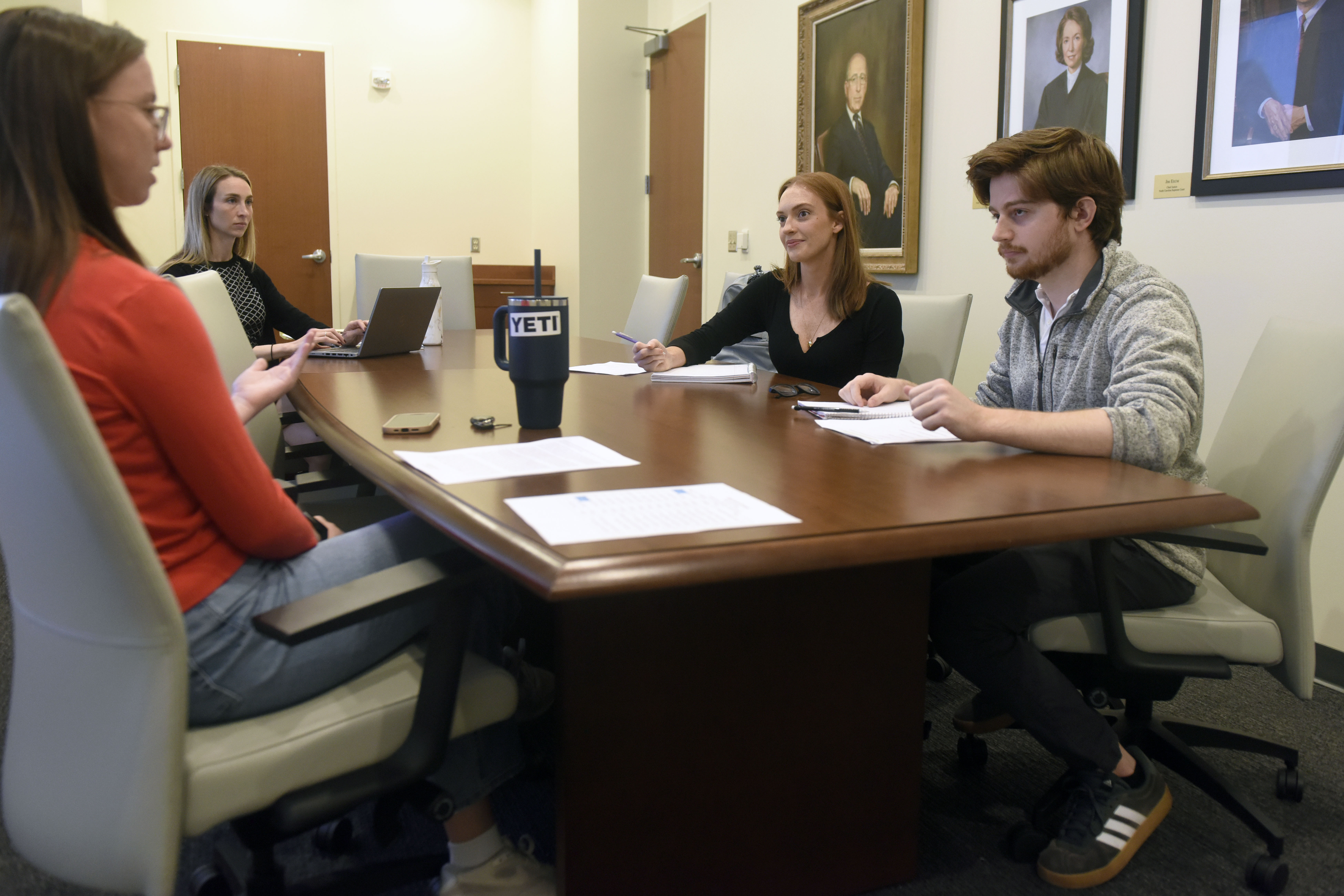Legal Method & Communication Program

Legal Writing at its Best
Elon Law’s Legal Method & Communication Program provides students with the rigorous, innovative instruction in legal research, writing, and oral communication that will help them become effective practitioners.
Led by Interim Director Caroleen Dineen, the LMC Program involves professors and mentors who operate across the law school curriculum. Dual-degreed lawyer/librarians teach legal research, and students can visit the Elon Law Writing Lab for individual assistance from a writing specialist. Every student works with an executive coach to develop speaking skills, in addition to advocacy skills honed in Elon Law’s extensive Trial Practice Program.
Our first-year curriculum consists of Legal Method & Communication I, II and III (each worth two credits) and a Legal Research course (one credit) that runs from October to March. Students are placed in the role of law clerk, lawyer or judge from their first day of class. Research and writing assignments are presented via a series of simulations during which students watch client interviews, provide research and objective advice to a supervisor, maintain client files and time sheets, prepare written and oral progress reports for a supervising attorney, write and orally argue motions on behalf of a client, write a brief to an appellate court, and deliver a formal oral argument to a panel of judges.
Topics in the fall term include reading legal authorities, understanding the structure of legal rules, traditional organizational paradigms in the legal field, legal citation, rule-based reasoning, case synthesis and common law analysis. Winter and spring terms provide numerous opportunities to practice these skills while studying more advanced topics, such as statutory interpretation and analysis, persuasive writing techniques, classical rhetorical devices, and types of legal argument.
Students learn in Legal Research how to find and evaluate primary and secondary legal authorities, and how to perform cost-effective legal research using both hard copy and electronic resources. They research procedural law and court rules in conjunction with writing assignments that give considerable attention to the importance of audience, tone, and purpose. Students also are introduced to the ethical and professional implications of the lawyer’s dual roles of advocate and officer of the court.
All upper-level students complete an advanced writing requirement and an off-campus residency placement. The advanced writing requirement can be satisfied by taking an advanced writing course such as Business Drafting, writing a law review note or seminar paper, or completing another writing-intensive course or project. During their signature residency-in-practice experience, a hallmark of Elon Law’s experiential curriculum, students perform a variety of research, writing and advocacy projects for placement supervisors.
In Their Own Words: Bridging Theory to Practice
We asked students about the value of legal writing in shaping their summer work experiences. Here’s what they had to say.
Writing Advice from a Distinguished North Carolina Jurist
The Hon. Mark Davis served as Elon Law’s 2021 Visiting Distinguished Jurist in Residence. In this video, which has been viewed thousands of times since that spring, Judge Davis offers five tips for writing effective appellate briefs.
The 2021 Carolinas Colloquium
The Carolinas Colloquium is a biennial event hosted on a rotating basis by law schools in North Carolina and South Carolina for legal research and legal writing faculty to exchange new ideas and best practices on teaching and scholarship. Elon University School of Law hosted the 2021 event in hybrid format. Nearly half of 60 registered participants attended in person in downtown Greensboro, North Carolina on June 24, with others joining via Zoom.
LMC Faculty
Visiting Professor of Law
Elon University School of Law
2005 Campus Box
Elon, NC 27244Assistant Professor of Law at the Elon University School of Law
Elon University School of Law
2005 Campus Box
Elon, NC 27244Associate Professor of Law and Director of Legal Method and Communication Program
No Building Available
2005 Campus Box
Elon, NC 27244Associate Dean for Academic Affairs and Professor of Law
Elon University School of Law 213
2005 Campus Box
Elon, NC 27244Legal Writing, Legal Education, Art Law, Artists Rights
Assistant Professor of Law
Elon University School of Law
2005 Campus Box
Elon, NC 27244Associate Professor of Law
Elon University School of Law
2005 Campus Box
Elon, NC 27244Assistant Professor of Law at the Elon University School of Law
Elon University School of Law
2005 Campus Box
Elon, NC 27244Visiting Professor of Law
Elon University School of Law
2005 Campus Box
Elon, NC 27244Adjunct Professor of Law
Elon University School of Law 209
2005 Campus Box
Elon, NC 27244


